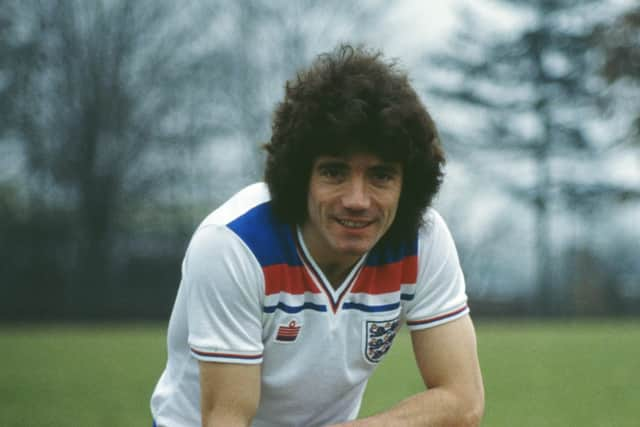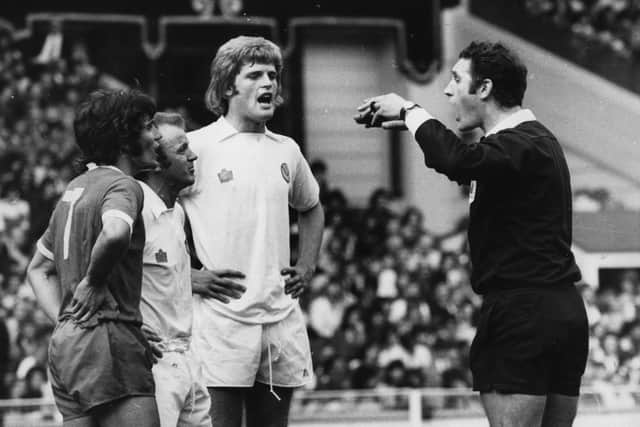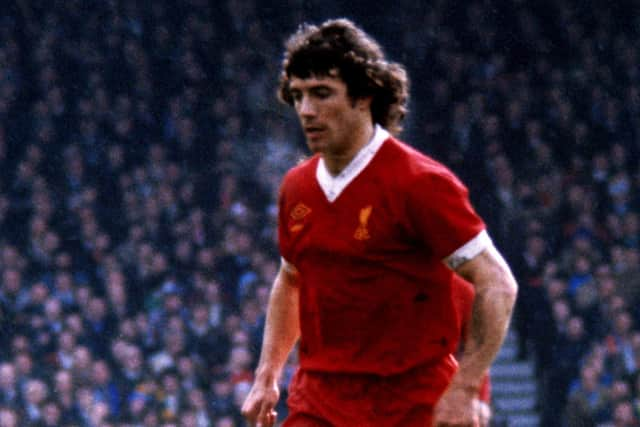Kevin Keegan, England’s only Ballon d’Or double-winner - sporting bygones
Back when deciding who won the most prestigious individual award in European football was a bit more complicated than ‘Heads it’s Leo, tails it’s Cristiano’, it was a really big deal. It still is.
Just three other Englishmen – the inaugural winner, Stanley Matthews, Bobby Charlton and Michael Owen – have won the award, each only once.
Advertisement
Hide AdAdvertisement
Hide AdWhen the little forward from Doncaster, three votes behind winner Allan Simonsen in 1977, retained his 1978 honour he became just the second person to do so after Johan Cruyff.


He could not match the likes of Cruyff or some of those he beat that year – such as Karl-Heinz Rummenigge (second with less than half Keegan’s votes), Ruud Krol (third) or Michel Platini (fifth) – for natural ability. Having described himself as “the mongrel who made it to Crufts”, it is not a claim he would object to, and nor should he as it only made his achievement all the more impressive.
What Keegan lacked in flair – and he probably overplayed that – he made up for with determination, fitness and a sense of his own worth. Having grown up the son of an Armthorpe colliery worker and toughened up in a local boxing gym, Keegan knew what he wanted and how he could get it.
What added to his Ballon d’Or achievements were that they came playing overseas. British footballers have never travelled well. John Charles was an honourable exception, wowing Italy between spells at Leeds United, but Juventus’s Ian Rush was more typical. “It was like living in a foreign country,” was the quote he will never live down.
Advertisement
Hide AdAdvertisement
Hide AdKeegan was not playing for a top international team, either – he began captaining England midway between the 1974 and 1978 World Cups they failed to qualify for.


Having worked his way up to Liverpool – he missed a trial with the club he supported, Doncaster Rovers, when he was given the wrong day and venue and started his career at Fourth Division Scunthorpe United – he had a very good thing going.
His final Liverpool appearance added their first European Cup to a personal trophy haul which included three league titles, two UEFA Cups and a European Cup. But even before his farewell 1976-77 season, Keegan had decided it would be his last. He had negotiated a £500,000 release clause in his contract.
“I’d run my race there,” he said. “I just fancied a challenge.”
Advertisement
Hide AdAdvertisement
Hide AdLiverpool should have known what they were dealing with from the moment they signed him in 1971 and the 20-year-old haggled his wages up to £50 a week by claiming he was on £45 with the potless Iron.


Europe’s glamour clubs were not queuing up. He joined SV Hamburg, European Cup Winners’ Cup winners but without a German title since 1960 when it went to the winners of a tournament between the top two in each regional competition.
Still, Hitachi-funded Hamburg were not only prepared to nearly double Germany’s record transfer fee but increase his wages from the £12,000 a year to £250,000 once all the many endorsement deals he hungrily took up were added.
Not that it was a walk in the park. His 19th-floor city hotel room was far from ideal for the dog owner, and his new team-mates were jealous of his pay and unhappy their team was being broken up against their express wishes. With just two foreign players allowed, popular three-times European Cup winner Horst Blankenburg was moved on, as was coach Kuno Kloetzer.
Advertisement
Hide AdAdvertisement
Hide Ad“In my first training session I can remember feeling deflated that I saw so little of the ball,” Keegan wrote in his autobiography. “It was amazing how many times the pass did not come.”
Pre-season went well enough, scoring in a 6-2 win over Barcelona and a 3-2 victory against Liverpool, but his competitive debut was a 5-2 defeat to Duisburg.
Liverpool won the Super Cup final 7-1 and when his replacement scored, the Kop chanted “we all agree, (Kenny) Dalglish is better than Keegan.”
Hamburg were 12th at the winter break, when Keegan hit the low point that turned his career there around.
Advertisement
Hide AdAdvertisement
Hide AdThe match against VfB Lubeck was a mid-season friendly rather than a pre-season game, but there was just something about those matches which did not agree with Keegan. Famously sent off for fighting Leeds United’s Billy Bremner in the 1974 Charity Shield, he was being niggled by Erhard Preuss when his boxing instincts kicked in again. The punch he threw earned him an eight-week ban and a chance to reflect.
“The more I was told I would not last as long as Jimmy Greaves, Denis Law et al, the more it motivated me,” he said.
He spoke to his old manager, Bill Shankly, and made more of an effort to integrate and learn German.
A 3-0 defeat to Fortuna Dusseldorf and 6-1 loss at Cologne showed his team-mates what they were missing and he began to be invited on more team nights out. The hotel room had been swapped for a farmhouse in the suburbs. Hamburg finished the season sixth, Keegan scored 12 goals and improved on his second place in the previous year’s Ballon d’Or, the first English winner since Charlton in 1966. Only Germans were eligible to be the Bundesliga’s player of the year.
Advertisement
Hide AdAdvertisement
Hide AdAs well as a fanatical fitness regime, Hamburg’s new coach for 1978-79, Branko Zebec, brought in Horst Hrubesch, the sort of big targetman Keegan made his name playing off when he struck up his telepathic Liverpool relationship with John Toshack.
Keegan missed a penalty in the opening-day 3-0 win over Borussia Monchengladbach, one of Europe’s best teams, but if it was a sign of what was to come for the team, the same was not true of its top-earner.
Big victories over Hertha Berlin, Schalke and Borussia Dortmund were matched by revenge over Cologne and Dusseldorf. December saw a statement 1-0 win over Bayern Munich.
“Mighty Mouse” scored 11 goals in the season’s final 12 matches and a three-month unbeaten run gave Hamburg the Bundesliga title. When the Ballon d’Or votes were counted in the run-up to Christmas, Keegan’s 118 gave him a landslide victory.
Advertisement
Hide AdAdvertisement
Hide AdMore was to come for Keegan, Hamburg overturning a 2-0 first-leg deficit to beat Real Madrid 5-3 on aggregate en route to a 1980 European Cup final defeat to Nottingham Forest, then another release clause exercised, another surprise move – to Southampton – and the building of more legends at Newcastle United.
Winning hearts has always come naturally to the man born on Valentine’s Day 1951 – but the cold, hard facts of what he achieved on Christmas Day, 1979 tell you what a player he was.
Comment Guidelines
National World encourages reader discussion on our stories. User feedback, insights and back-and-forth exchanges add a rich layer of context to reporting. Please review our Community Guidelines before commenting.